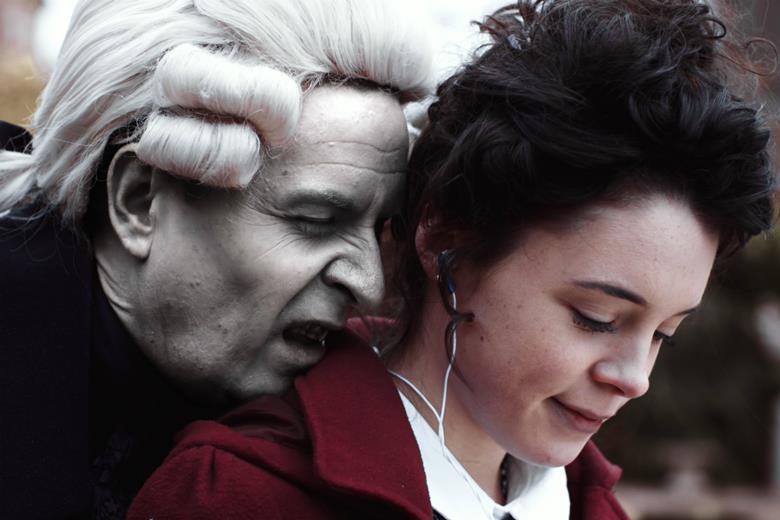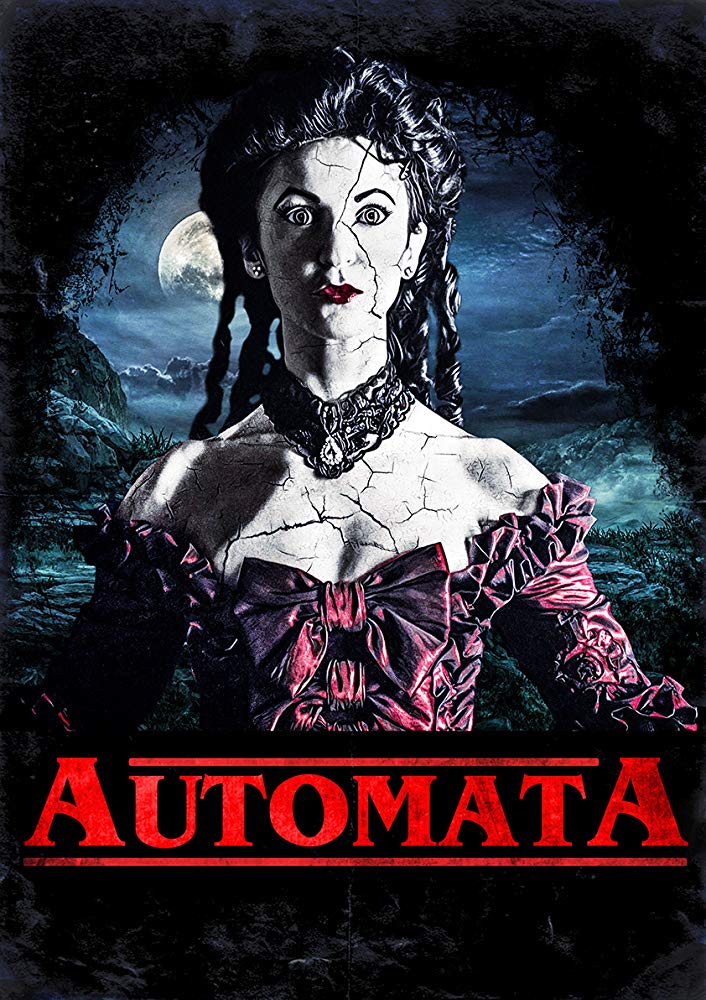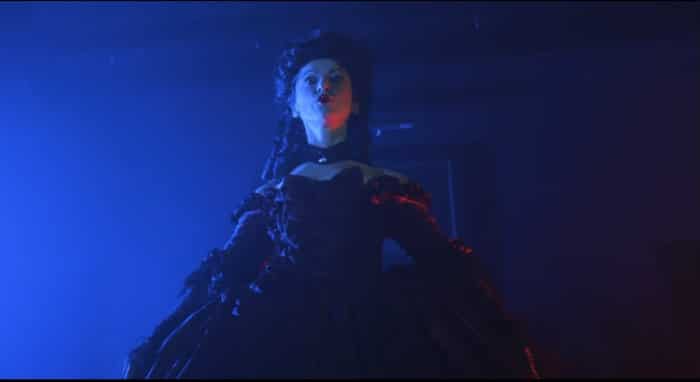
It’s been close to six years since I reviewed director Lawrie Brewster’s second feature film, the cryptozoological horror Lord of Tears; at the time, I was impressed with the film’s imagination and its sense of a reverence for classic horror fare, but found it a sometimes muddled film in which certain sequences should have been cut out completely. Having recently seen his newest film Automata (again scripted by close collaborator Sarah Daly) I have a strong sense of deja-vu. Automata is also bursting with ideas, and seems to be hearkening back to the glory days of the likes of Amicus. Its subject matter, indeed, is worthy of that studio, as well as certain others of the era, which I gather were influential on this production. However – and it’s a big however – the way in which the plot is developed and realised is nothing short of garbled, or even downright barmy.
The film begins with a period setting, which in itself is pretty bold on a budget: a band of 18th century soldiers transporting a mysterious trunk are ambushed by an army who wants whatever’s inside it. Many men soon afterwards lose their lives, but we never get to see the trunk’s contents for all that. Instead, we move to the current day. Historian Brendan Cole (Jamie Scott Gordon) is approached by a wealthy collector who wants his expertise on what’s been assumed a folk story about a clockwork doll known as ‘the Inferno Princess’. (This, we can assume, is what was in the trunk 300 years previously.) Cole has written extensively about the Princess, but he’s staggered by his would-be patron’s claim that he may have found the doll itself – intact, functional and needing only to be verified by an expert – i.e. him. Being offered a million pounds for the job, which will take a week, he can hardly refuse. He takes his grown-up stepdaughter Rose (Victoria Lucie) with him to the house in question, and begins to run his tests on the doll.

Of course, the doll has a mysterious power of its own, and begins to affect both Brendan and Rose. The Princess doesn’t really look like an automaton of the day, and it’s hard to get a sense that this is a clockwork effigy of a person without any SFX beyond cosmetics, but there are some neat aesthetics here. Gradually, Brendan and Rose are able to piece together the sad history of the doll; it’s an effigy of a noblewoman with a tragic story. Her likeness was captured at its most perfect, but it seems the relationship between the model and the automaton project was never an easy one and all sort of things went wrong along the way. As they gather the finer details, ghostly goings-on begin to overtake the house, and the influence of the doll – or Talia, the woman copied for the doll – threatens them both.
All of this would be perfectly fine, perfectly reasonable and enjoyable fodder for a horror yarn, and I always want to give credit where filmmakers come along with ideas for an original mythos of their own. Seriously, it would be very easy to make something perfectly saleable out of tried-and-tested ideas, but Brewster doesn’t do that. That’s worthy of respect. But it’s frustrating when these ideas are brought to the screen in ways which either don’t make sense, blow any sense of intrigue or mystique along the way by questionable handling, or worst of all, descend into farce. Whilst AIP etc. had elements of camp, they were more practised than they were hokey, and the dialogue tended towards melodrama. That worked perfectly for films like The Masque of the Red Death, and part of me wishes that was the approach taken here. Instead, during the screening, there was that sickly-awkward feeling whereby the audience slowly collapsed into laughter as the film progressed – all the time knowing that the cast and crew were sat in the same screening. Brewster and his team acknowledged the film’s elements of camp afterwards, and said that they were deliberate; some of them might have been, but I seriously doubt all of the lines sending people into meltdown were really meant to do so. This film is/was in desperate need of someone to say, ‘You can’t put that in, that sounds ridiculous.’ A camp classic this may well become, but I cannot believe it was all intended and – sorry – the script in places is utterly dire. It jeopardises everything else the film could have achieved and undoes the work being done elsewhere.
Sadly, there’s more. The relationship between Rose and Brendan – stepfather and stepdaughter, remember – is incredibly cringe-inducing, with flirtation, ass-slapping and even the beginnings of a sex scene, though thankfully things stop short – just. I’m not sure of the thinking behind this, and why this quite honestly couldn’t have just been an estranged couple with no deceased mother/partner thrown into the mix; the screenplay’s incestuous leanings add nothing here, except another layer of awkwardness. But I could maybe – maybe – forgive the script giving time to this, if I felt that I really understood what had happened in the plot by the end; sadly, the film feels like it ends multiple times, and scoots over key things that I felt I needed to know anyway. On the altar of atmosphere is much coherence sacrificed.
So it’s a frustrating experience, this film. Automata – is there some meaningful reason behind using the plural form in the title? I’m unsure – has ample ideas, a sense of where it comes from, great locations, clear potential and bags of ambition. Everything is set for a great, original British horror. But the performances, the stylistic decisions and most of all, how the plot tumbles out via a jaw-dropping script turns this potential into a bizarre skit, I’m sorry to say. Whilst there’s plenty of entertainment to be had in this film, I have a horrible feeling it’s through laughing at it, not with it.
Automata screened at Frightfest Glasgow on 2nd March 2019.
